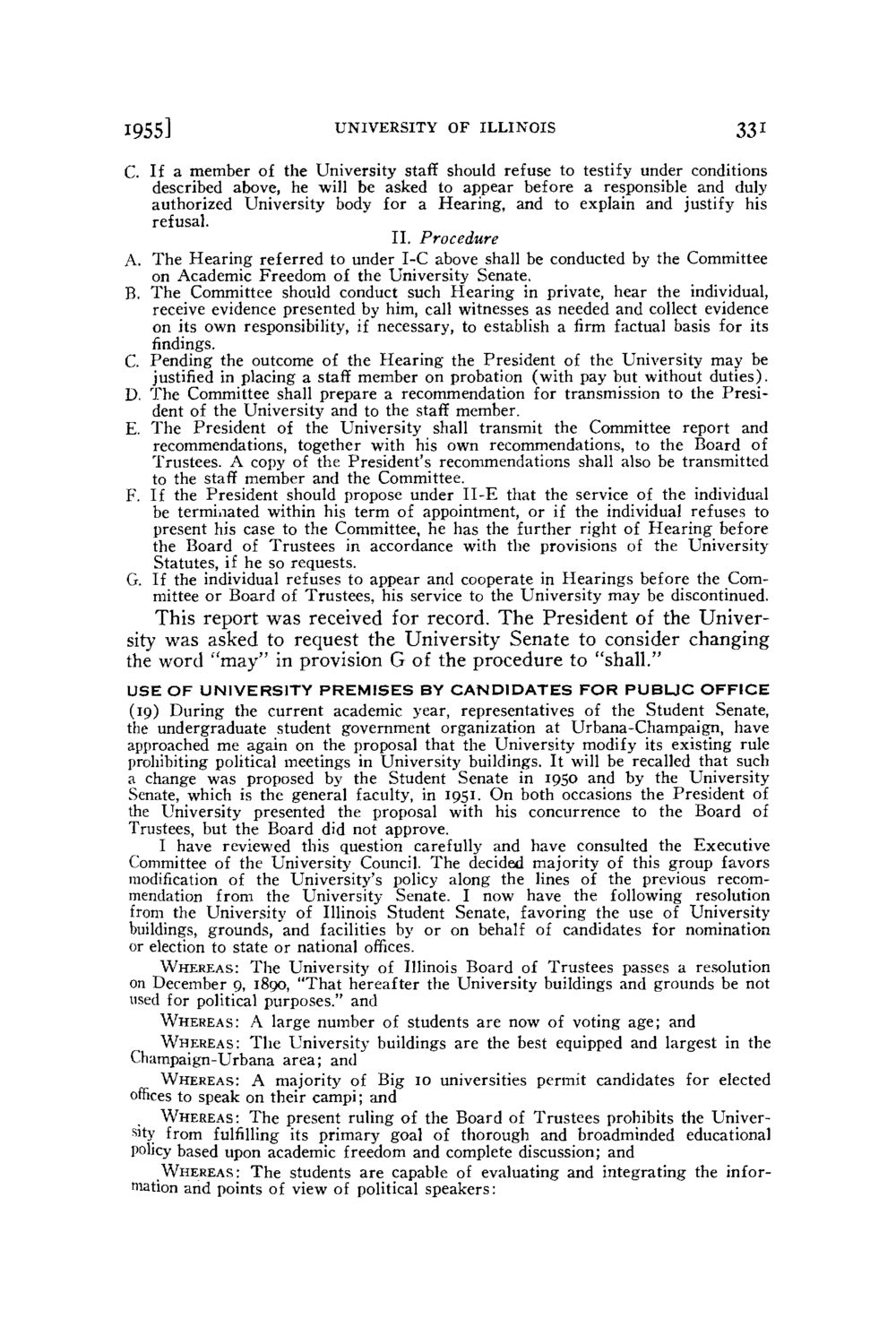| |
| |
Caption: Board of Trustees Minutes - 1956
This is a reduced-resolution page image for fast online browsing.

EXTRACTED TEXT FROM PAGE:
1955] UNIVERSITY OF ILLINOIS 331 C. If a member of the University staff should refuse to testify under conditions described above, he will be asked to appear before a responsible and duly authorized University body for a Hearing, and to explain and justify his refusal. II. Procedure A. The Hearing referred to under I-C above shall be conducted by the Committee on Academic Freedom of the University Senate. B. The Committee should conduct such Hearing in private, hear the individual, receive evidence presented by him, call witnesses as needed and collect evidence on its own responsibility, if necessary, to establish a firm factual basis for its findings. C. Pending the outcome of the Hearing the President of the University may be justified in placing a staff member on probation (with pay but without duties). D. The Committee shall prepare a recommendation for transmission to the President of the University and to the staff member. E. The President of the University shall transmit the Committee report and recommendations, together with his own recommendations, to the Board of Trustees. A copy of the President's recommendations shall also be transmitted to the staff member and the Committee. F. If the President should propose under I I - E that the service of the individual be terminated within his term of appointment, or if the individual refuses to present his case to the Committee, he has the further right of Hearing before the Board of Trustees in accordance with the provisions of the University Statutes, if he so requests. G. If the individual refuses to appear and cooperate in Hearings before the Committee or Board of Trustees, his service to the University may be discontinued. This report was received for record. The President of the University was asked to request the University Senate to consider changing the word "may" in provision G of the procedure to "shall." USE OF UNIVERSITY PREMISES BY CANDIDATES FOR P U B U C OFFICE (19) During the current academic year, representatives of the Student Senate, the undergraduate student government organization at Urbana-Champaign, have approached me again on the proposal that the University modify its existing rule prohibiting political meetings in University buildings. It will be recalled that such a change was proposed by the Student Senate in 1950 and by the University Senate, which is the general faculty, in 1951. On both occasions the President of the University presented the proposal with his concurrence to the Board of Trustees, but the Board did not approve. I have reviewed this question carefully and have consulted the Executive Committee of the University Council. The decided majority of this group favors modification of the University's policy along the lines of the previous recommendation from the University Senate. I now have the following resolution from the University of Illinois Student Senate, favoring the use of University buildings, grounds, and facilities by or on behalf of candidates for nomination or election to state or national offices. WHEREAS: The University of Illinois Board of Trustees passes a resolution on December 9, 1890, "That hereafter the University buildings and grounds be not used for political purposes." and WHEREAS: A large number of students are now of voting age; and WHEREAS: T h e University buildings are the best equipped and largest in the Champaign-Urbana area; and WHEREAS: A majority of Big 10 universities permit candidates for elected offices to speak on their campi; and WHEREAS: The present ruling of the Board of Trustees prohibits the University from fulfilling its primary goal of thorough and broadminded educational policy based upon academic freedom and complete discussion; and WHEREAS: The students are capable of evaluating and integrating the information and points of view of political speakers:
| |